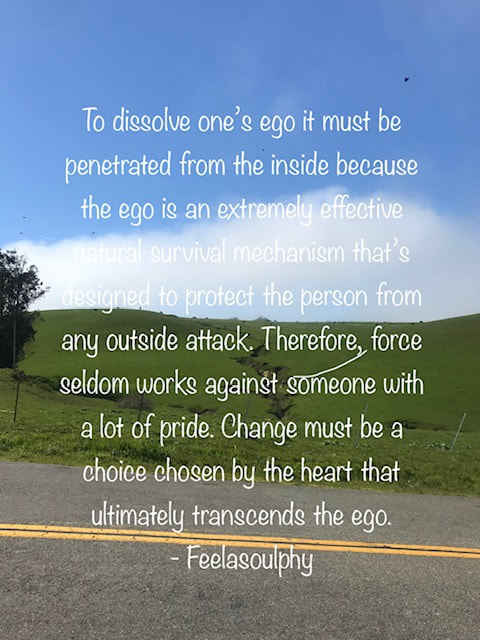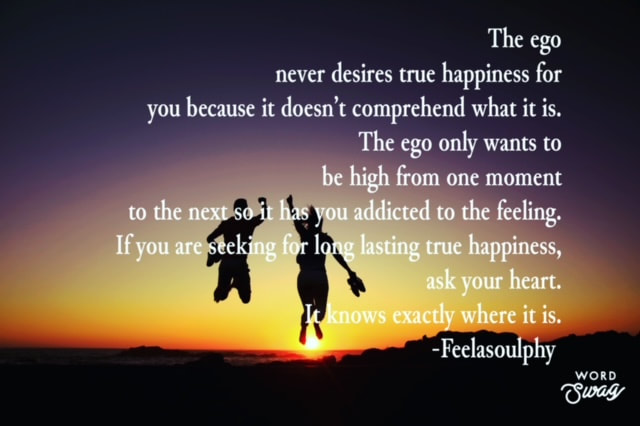|
Imagine sitting in a car. You’re the observer. But who’s driving? For most people, the answer is the ego—firmly gripping the wheel, speeding toward desires, defending against imagined threats, chasing approval, status, and power. Meanwhile, the higher self—the wise, calm navigator—sits quietly in the backseat. But what happens when we let ego drive not just our lives, but our entire world? Let’s explore what the ego truly is, why it exists, how it functions in the brain, and what happens when we allow it to dominate—individually and collectively. What Is the Ego? In psychology, the ego is the part of our mind that helps us function in the world. It negotiates between our instincts (id), moral ideals (superego), and external reality. It forms a sense of identity—the “I” that interacts with the world. In spirituality, the ego is the false self. It’s the mask we wear, the roles we play, the stories we believe about who we are. It operates in separation, fear, and comparison. It says, “I am this body, this status, this job, this belief.” But none of those are truly you. How the Ego Operates in the Brain The ego thrives on dopamine—the brain’s reward chemical. Every time you receive praise, a win, a like on social media, or prove someone wrong, the ego feels validated. You get a dopamine hit. You feel important. But it doesn’t last. This is why the ego constantly chases--more money, more validation, more control. It also reacts quickly to threats, real or perceived. A raised eyebrow can feel like an attack. The ego’s job is to protect the false identity it has created. So it responds with anger, pride, defensiveness—or aggression. It was once useful for survival. But now, it mostly defends illusions. When the Ego Causes Suffering Let’s say someone insults you. You feel rage. That’s the ego defending its image. In that moment, you suffer from the intensity of the emotion—and you may hurt someone else in response. The ego’s mission is to maintain its version of truth. It justifies its reactions and rarely admits fault. That’s why it’s hard for people trapped in ego to back down, apologize, or reflect. This isn’t just personal—it’s collective. The Rise of the Ego-System We live in an Ego-System—a society built to feed and reward egoic behavior. From advertisements that say, “Look what they have—you need this too,” to social media platforms that reward attention-seeking and outrage, we are constantly being trained to feed our false self. The bigger the ego, the bigger the desires—and the greater the consumption. Success is often measured not by inner peace or love, but by how much you have, how loud you are, and how many people follow you. This system has normalized ego-driven behavior. We excuse it, reward it, even admire it. Famous Examples: When Ego Rules Let’s take a closer look at a few familiar figures: Donald Trump Regardless of politics, he’s widely seen as someone with a strong ego. His success has often come through fear-based negotiation, force, and bold self-promotion. In an ego-driven society, that’s effective. We say, “He gets things done,” even if the cost is emotional, relational, or moral. But this approach brings long-term damage—internally and externally. Resistance follows force. Power built on fear cannot bring peace. Elon Musk A visionary with enormous ambition, but his unfiltered tweets and provocative behavior reveal a restless ego at work. He may create groundbreaking innovations, but the thrill of ego often takes center stage—sometimes overshadowing the mission. This isn’t judgment—it’s observation. We all have ego. But the bigger it grows, the harder it is to see clearly. History Doesn’t Lie Let’s reflect on the past:
The ego always crashes. It’s not a question of if—but when. No illusion can last forever. What’s built on fear, separation, and pride will eventually collapse under its own weight. The Alternative: Letting the Soul Drive The ego isn’t evil. It’s just not meant to lead. The goal isn’t to kill the ego—it’s to move it to the backseat. Let your higher self—your soul, your truth, your deeper wisdom—take the wheel. The ego can still speak up when it needs to protect or push you into action. But it doesn’t need to drive your decisions, relationships, or life purpose. Because a life led by ego may win battles—but it loses peace. And a world led by ego might gain power—but it sacrifices soul. A Final Reflection We are in a time of heightened ego momentum. The world feels louder, angrier, and more divided. That’s not just coincidence—it’s the ego-system in full swing. But awareness is the beginning of transformation. Notice the voice in your mind that demands, defends, and divides. Then ask: Who is really driving? When the soul leads, the path is slower, softer, but infinitely wiser. Want to dive deeper into this topic or share your reflections? Leave a comment or share this article with someone navigating their own ego journey. Let’s raise collective awareness—one soul at a time.
0 Comments
Seeking approval can be a powerful motivator, driving you to achieve higher and larger goals than you might without it. This behavior aligns with the need for external validation, where your sense of self-worth becomes tied to others’ opinions. However, this same force can also become a never-ending source of suffering, much like being on a hedonic treadmill. No matter how much success you achieve, the feeling of accomplishment is short-lived, and you’re left continually seeking more approval. As a result, you may never feel truly accomplished, even when you’ve achieved significant success. You may not even realize that you're seeking approval, as this behavior can be buried deep in your subconscious. Here are some signs to help you recognize it, along with actionable steps to overcome these tendencies: 1. You get upset when someone challenges your ideas. Why this happens: When your sense of worth is tied to approval, disagreements feel like personal attacks rather than opportunities to learn. Solution: Shift your mindset from seeking validation to seeking growth. Embrace challenges as a way to expand your understanding and consider others' perspectives. 2. You feel a rush of happiness when someone agrees with you, and you want to feel it again. Why this happens: This is a form of external validation where your happiness relies on others’ approval. Solution: Practice self-validation. Ask yourself, “Do I believe in my idea or action regardless of others’ approval?” Develop the habit of internally affirming your decisions based on your values. 3. You often feel superior to others or thrive in competitive environments. Why this happens: Competition can be a way to seek validation by proving you're better than others. Solution: Focus on collaboration instead of competition. Aim to grow alongside others rather than surpassing them. Shift from ego-driven goals to community-oriented objectives. 4. You're addicted to the feeling of success and need to keep achieving more. Why this happens: Achieving success can create a "high," but when that fades, you may feel empty and seek another achievement to fill the void. Solution: Reframe success as an ongoing journey rather than a destination. Practice mindfulness and celebrate your small wins along the way. Develop a sense of contentment with where you are in the present moment. 5. You love recognition and crave being noticed or acknowledged for your efforts. Why this happens: The need for recognition can stem from a lack of internal self-worth. Solution: Cultivate self-recognition. Journaling can help—write down your accomplishments daily and appreciate them, even if no one else does. Practice recognizing your value independent of external praise. 6. You love to argue or prove your point. Why this happens: Constantly defending your ideas can be a way of seeking validation for your beliefs. Solution: Learn to detach your self-worth from being right. Instead of seeking to win arguments, focus on healthy dialogues where both parties can learn and grow. 7. You enjoy seeing others fail or feel envious of their success. Why this happens: When success is tied to external validation, others' achievements can feel like a threat to your own self-worth. Solution: Practice genuine happiness for others' success. This helps shift your mindset from scarcity to abundance, reminding you that there's enough success for everyone. 8. You crave attention or seek validation from others. Why this happens: The desire for attention often comes from an internal void that hasn’t been filled with self-love. Solution: Develop self-compassion and practice being alone without needing external distractions or validation. Meditation and mindfulness can help strengthen your internal sense of worth. 9. You find yourself people-pleasing, sacrificing your own needs to win approval. Why this happens: People-pleasing is a classic form of seeking approval, as it focuses on making others happy at your own expense. Solution: Set boundaries and practice saying no. Realize that your worth isn’t dependent on how much you do for others, but on being true to yourself. 10. You love hearing compliments and constantly seek external praise. Why this happens: Compliments can feel validating, but relying on them can create dependency. Solution: Instead of seeking external praise, learn to give yourself compliments. Practice affirmations and build a positive internal dialogue to reinforce your self-esteem. 11. You struggle to let go of past failures, fearing judgment. Why this happens: Fear of judgment ties your self-worth to your past mistakes. Solution: Embrace failure as a learning experience. Everyone makes mistakes—what matters is how you grow from them. Develop resilience by practicing self-forgiveness. 12. You try too hard to persuade others to believe what you believe. Why this happens: Needing others to agree with you stems from a fear of being wrong or misunderstood. Solution: Accept that not everyone will share your beliefs, and that’s okay. Let go of the need to convince others, focusing instead on having open, respectful discussions. 13. You have an insistent need to be right all the time. Why this happens: Being right can feel like a way to affirm your intelligence or competence. Solution: Practice intellectual humility. Recognize that learning from others, and being open to new ideas, is more valuable than always being right. 14. You frequently complain or seek sympathy from others. Why this happens: Seeking sympathy can be a way of attracting attention and approval from others. Solution: Shift from complaining to problem-solving. Take ownership of your challenges and focus on solutions rather than seeking sympathy. 15. Others' opinions and judgments have a strong impact on your emotions and self-worth. Why this happens: When your self-esteem is based on others' opinions, you become vulnerable to external judgments. Solution: Practice detaching from others’ opinions. Ask yourself, “What do 'I' think?” and work on building a strong internal sense of self that isn’t swayed by external views. 16. You take credit for other people’s work to gain approval. Why this happens: This behavior arises from a desire to appear more competent or accomplished than you feel. Solution: Acknowledge the contributions of others openly and practice gratitude. Recognize that collaboration can be more rewarding than personal accolades. Overcoming approval-seeking behavior is a journey that requires patience and self-awareness. By recognizing these signs and adopting healthier practices, you can shift from relying on external validation to fostering inner confidence and peace. Imagine how liberating and peaceful it would feel to let go of the burden of seeking approval in your life. Cultivating self-esteem from within empowers you to live authentically and freely, without the constant pressure to seek validation from others. If ego gratification fuels your cause, you might resort to unethical actions to satisfy it, risking burnout and even severe irreversible consequences. A lasting motivation requires a higher purpose beyond self-preservation to endure a lifetime. Consider the contrasting stories of Lance Armstrong and Mahatma Gandhi. Armstrong's ego-driven decisions in professional cycling, such as doping scandals, resulted in a downfall. In contrast, Gandhi, motivated by a higher purpose of justice and societal improvement, pursued nonviolent resistance for India's independence. Reflect on whose legacy endures—Armstrong's with consequences or Gandhi's with lessons for current and future generations. Who would you aspire to be? - Feelasoulphy To dissolve one’s ego it must be penetrated from the inside because the ego is an extremely effective natural survival mechanism that’s designed to protect the person from any outside attack. Therefore, force seldom works against someone with a lot of pride. Change must be a choice chosen by the heart that ultimately transcends the ego. - Feelasoulphy Pride and ego hinder growth. So, the more pride and ego you have the less you will grow. - Feelasoulphy The ego never desires true happiness for you because it doesn’t comprehend what it is. The ego only wants to be high from one moment to the next so it has you addicted to the feeling. If you are seeking for long lasting true happiness, ask your heart. It knows exactly where it is. - Feelasoulphy |
AuthorFeelasoulphy Categories
All
Archives
December 2024
|






 RSS Feed
RSS Feed